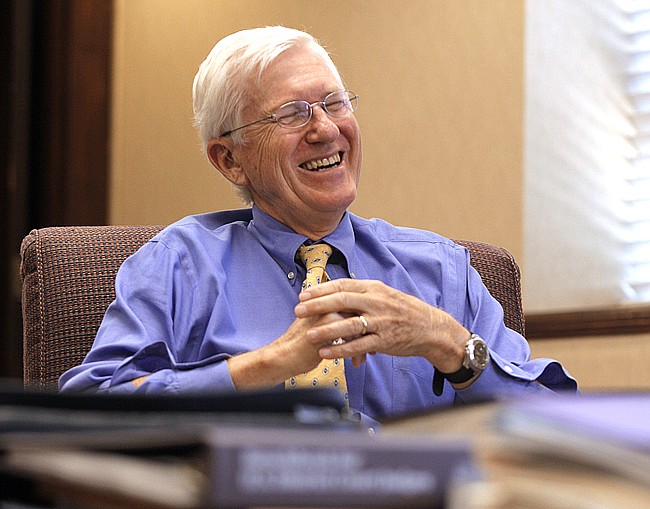White cardboard boxes and newspaper clippings are the physical reminders of more than four decades of legal work that will remain in Chattanooga after U.S. District Judge R. Allan Edgar moves to his native Michigan.
But Edgar's decisions on key federal cases and his impact on legal colleagues will echo long after he's settled into his home in Marquette.
"I don't think anyone could handle a trial as well as he did," said Chief District Judge Curtis Collier. "I set out to emulate him in many ways."
Edgar's patience set him apart from many judges, colleagues said.
A judge often can be an intimidating figure and try to direct lawyers in his court rather than letting them explain their cases, Collier said.
But Edgar listened and let attorneys work through their arguments, he said.
A full head of white hair, blue eyes and an easy smile greet those who shake Edgar's hand. His clear Midwestern accent doesn't reveal that Edgar, 70, has lived in the South since he was 12.
But the former one-term state legislator jokes he can turn on the Southern charm when needed.
Edgar took "senior status" in 2005, which allows retired judges to continue trying cases part-time. About 15 percent of all federal cases are handled by senior status judges, according to the U.S. Courts website.
Since then he has split his judicial duties between the Eastern District of Tennessee and the Western District of Michigan. As of Friday he will serve only in the Michigan district.
Both districts are within the U.S. Court of Appeals for the Sixth Circuit.
Because senior status is voluntary, no replacement is slated for Edgar. There won't be a new federal judge in the Eastern District unless one of the sitting judges retires and elects to take senior status.
"It's a fantastic job. You get to see a lot of slices of life, the good and the bad," Edgar said. "But you get an opportunity to see that elusive thing which we call justice."
Edgar moved with his family to Athens, Tenn., from Michigan as a boy when his father worked for Bowater. After finishing college and a tour as a U.S. Army intelligence officer in Vietnam, Edgar began working with Miller & Martin law firm in 1967.
He was elected to the Tennessee Legislature in 1970, served two years and worked as Southeast regional coordinator on the re-election campaign of Sen. Howard Baker before returning to private law practice.
Baker recommended Edgar for the open federal judgeship, and he was appointed in 1985.
During his swearing-in ceremony, Miller & Martin colleague Lowery Kline joked about Edgar's motivations to take the job.
"The reason Edgar wanted to be judge was that he would have office space in his chamber large enough so that he can run his bird dogs," Kline said, according to newspaper archives.
Edgar, an avid outdoorsman, said that when he's not on the bench in Michigan he'll likely fish or spend time with his wife, Gail, their two children and four grandchildren.
"He tried to teach me how to fly fish, and he wasn't real successful at that," longtime friend Howard Levine remembered. Levine added, though, that the unsuccessful lesson was more his fault than Edgar's.
As the only federal judge in Chattanooga until the mid-1990s, Edgar kept busy on the bench.
Three years into the job he decided the Brown v. Board of Commissioners case that changed Chattanooga's form of government from at-large commission elections to district council seats that better represented minority populations.
Edgar also decided a then quarter-century-old case, Mapp v. Board of Education of City of Chattanooga, that finally desegregated the city's school system.
Not every case was monumental; some were just memorable.
In 1986, Edgar upheld a city ordinance enforcing the "six-foot-rule" for strip clubs and adult bookstores; it required exotic dancers and models to remain at least six feet from patrons.
Since taking senior status, Edgar said he has probably had a quarter of the caseload he did as a judge. And a smaller office, one floor down.
Last week, a framed photograph of Edgar at his desk in his expansive chief judge's chambers on the third floor of the federal courthouse sat propped near a pile of his books and boxes in his current office.
The larger chambers has been Collier's for more than five years, but he said it will "always be Judge Edgar's chambers" as far as he's concerned.
Down the hall from Edgar's office, stacks of cardboard boxes and massive books filled with newspaper clippings awaited donation to the Chattanooga-Hamilton County Bicentennial Library.
Edgar's case notes stuffed the boxes, marking his thoughts on courtroom events over nearly three decades.
Colleagues repeatedly complimented Edgar's intellect and integrity during recent interviews.
"He never put on airs or played to the audience to make himself seem more intimidating," said U.S. District Judge Harry "Sandy" Mattice. "We will certainly miss him."
